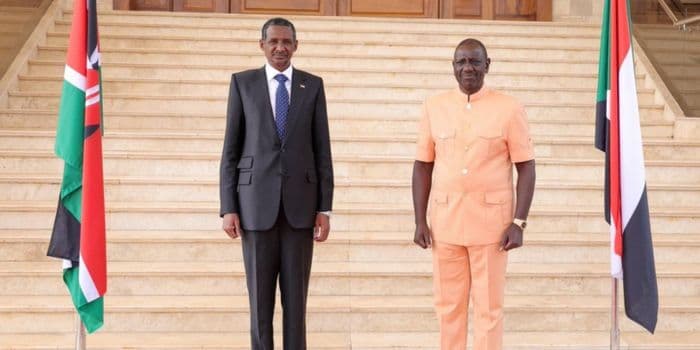Kenya and RSF Hand in Sudan War: How Nairobi’s Dealings Deepened a Genocidal Conflict

When fighting erupted in Sudan in 2023, the world watched another tragic chapter unfold in a country long haunted by war and political betrayal. But by early 2025, an unexpected twist placed Kenya at the center of that storm. It began when leaders of the Rapid Support Forces (RSF), the paramilitary group accused of some of the worst atrocities in Sudan’s modern history, arrived in Nairobi for a series of meetings.
The talks culminated in an agreement to form what they called a “government of peace and unity”, effectively a parallel government to that of General Abdel Fattah al-Burhan’s Sudanese Armed Forces (SAF). The event, reportedly hosted under the watch of President William Ruto’s administration, turned Kenya’s long-standing image as a neutral peacemaker into that of a state with a dangerous stake in Sudan’s conflict.
The RSF, originally formed from the Janjaweed militias that terrorized Darfur in the 2000s, has been accused by the United Nations and numerous human rights organizations of carrying out systematic massacres, ethnic cleansing, and widespread sexual violence.
In Darfur, entire communities have been wiped out, women and children have fled in their thousands, and villages have been burned to the ground. What many observers now describe as a slow-moving genocide has turned into a regional crisis that risks destabilizing much of East Africa.
Kenya’s involvement, however unintentional it might have been, has complicated its diplomatic standing. The Nairobi meetings, which Kenyan officials defended as part of a “peace dialogue,” were interpreted by Khartoum and several international actors as a clear endorsement of a faction responsible for war crimes.
The Sudanese government condemned Kenya’s actions, accusing President Ruto’s administration of legitimizing rebels and interfering in Sudan’s internal affairs. Within days, Sudan recalled its ambassador from Nairobi, describing the event as “a direct affront to Sudan’s sovereignty.”
The controversy deepened when a BBC investigative documentary revealed that some weapons used by the RSF bore Kenya Defence Forces (KDF) markings. According to the report, several munitions and weapon crates recovered from RSF-controlled areas carried tags and serial numbers consistent with those used by the KDF’s procurement division.
While the Kenyan Ministry of Defence denied any official involvement and insisted that the equipment could have been part of “diverted or stolen stock,” the images of crates bearing KDF logos circulating online raised uncomfortable questions.
How did Kenyan-labelled weapons find their way into one of Africa’s bloodiest conflicts? Were they sold, diverted through private brokers, or re-exported through third parties without Nairobi’s consent?
Diplomats and analysts argue that Kenya’s eagerness to establish itself as the region’s peace hub may have backfired. For years, Nairobi hosted peace talks for South Sudan, Somalia, and Ethiopia, earning a reputation as a reliable mediator. But hosting RSF leaders — while atrocities continued in Darfur, blurred the line between diplomacy and complicity.
Many civil society groups and human rights advocates across Africa condemned the move, accusing the Ruto administration of undermining international efforts to isolate those responsible for war crimes.
The RSF’s political maneuvering in Nairobi also raised fears that Kenya was being used as a diplomatic platform to legitimize a group trying to divide Sudan. By signing an agreement to form a “parallel government,” the RSF effectively declared its intention to rule territories under its control.
The event sent shockwaves across the African Union and IGAD, both of which have repeatedly warned against any actions that could deepen Sudan’s fragmentation.
For Kenya, the fallout has been swift and severe. Its relations with Khartoum have soured, and questions are now being asked within the African Union about whether Kenya can still serve as a credible mediator in regional conflicts. The possibility that arms linked to its military may have been used in Sudan’s genocide further threatens to taint its image internationally.
At the heart of this crisis lies a grim irony. Kenya, long seen as a beacon of stability in East Africa, now finds itself entangled in a war it once sought to help resolve. Whether through misplaced diplomacy or covert dealings that went unnoticed, Nairobi’s entanglement with the RSF has turned it from a neutral observer into a suspect actor.
As Sudan burns, the moral and political questions facing Kenya grow heavier by the day. Did the pursuit of influence and regional leadership blind its leaders to the dangers of legitimizing a group accused of mass murder? And if Kenyan-labelled weapons truly found their way into the RSF’s hands, will Nairobi submit to an independent investigation to clear its name?
For now, Kenya stands in a precarious position, caught between the desire to lead Africa’s peace efforts and the suspicion that it has inadvertently fueled one of its worst humanitarian tragedies.
